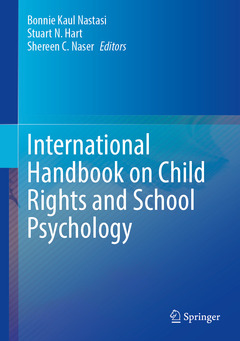International Handbook on Child Rights and School Psychology, 1st ed. 2020
Coordonnateurs : Nastasi Bonnie Kaul, Hart Stuart N., Naser Shereen C.

This handbook examines the meanings, implications, and transformative potential of a child-rights approach for school psychology. It focuses on the school community, in which psychology is committed to promoting well-being, learning, and development of all children. The handbook begins with an overview of the 1989 United Nations Committee on the Rights of the Child (CRC) and explores main themes such as, survival, protection, development, participation, and nondiscrimination. Chapters provide guidance in promoting and protecting child rights when dealing with critical issues relevant to the school community, including well-being, freedom from violence, and access to high quality education. In addition, chapters analyze and offer recommendations for child rights applications within the roles and responsibilities of school psychologists. The handbook concludes with future directions for achieving a child-rights approach for school psychology.
Topics featured in this handbook include:
- The current status of child rights in the international community.
- Accountability for child rights by school psychology.
- Collaborative home, school, and community practices aimed at promoting family support.
- Protecting child rights within the realm of competitive sports.
- CRC and school-based intervention programming.
- Promoting child rights through school leadership.
- Applying child rights-respecting research to the study of psychological well-being.
The International Handbook on Child Rights and School Psychology is a must-have resource for researchers, scientist-practitioners, clinicians, and graduate students in child and school psychology, educational policy and politics, social work, public health, and other school-based or child-serving mental health disciplines.
Bonnie Kaul Nastasi, Ph.D., (Kent State University, 1986, School Psychology & Early Childhood Education)is a Professor in the Department of Psychology, School of Science and Engineering, at Tulane University. Dr. Nastasi co-directs a trauma specialization in the School Psychology PhD Program at Tulane. Dr. Nastasi’s research focuses on the use of mixed methods designs to develop and evaluate culturally appropriate assessment and intervention approaches for promoting mental health and reducing health risks such as sexually transmitted infections (STIs) and HIV, both within the US and internationally. She has worked in Sri Lanka since 1995 on development of school-based programs to promote psychological well-being and directed a multi-country study of psychological well-being of children and adolescents with research partners in 12 countries from 2008-2013. She was one of the principal investigators of an interdisciplinary public health research program to prevent STIs among married men and women living in the slums of Mumbai, India from 2002-2013. She is active in promotion of child rights and social justice within the profession of school psychology and has directed the development of a curriculum for training school psychologists internationally on child rights, a joint effort of International School Psychology Association (ISPA), International Institute of Child Rights & Development (IICRD), School Psychology Division (16) of the American Psychological Association (APA), Tulane University’s School Psychology Program, and Cleveland State University’s School Psychology Program. She is past president of Division 16 and past co-chair of APA’s Committee for International Relations in Psychology (CIRP). Currently, Dr. Nastasi is APA Council Representative for Division 16 and Past-President of ISPA. She is a Fellow of APA Divisions 16 (School) and 52 (International). Dr. Nastasi received the 2019 Senior Scientist Award from APA’s Division 16.
<Explores the transformative potential of a child-rights approach for school psychology
Synthesizes the major themes of the United Nations Convention on the Rights of the Child (CRC) in context of the roles and responsibilities of school psychologists
Provides an ecological-developmental conceptual foundation for understanding the CRC
Proposes future directions for achieving a child-rights approach for school psychology?
Date de parution : 05-2020
Ouvrage de 635 p.
17.8x25.4 cm
Thèmes d’International Handbook on Child Rights and School Psychology :
Mots-clés :
Abuse and child rights; Child development and child rights; Child rights and school psychology; Child rights in the international community; Child well-being and school psychology; Children’s rights and school psychology; Integrity and school psychology; Intervention and child rights; Juvenile justice and child rights; Mental health nondiscrimination and child rights; Neglect and child rights; Nondiscrimination and child rights; Prevention and child rights; Professional ethics for school psychologists; Professional practice for school psychologists; Refugee status and child rights; School community and accountability for child rights; Strengths-based approaches and child rights; Survival and children’s rights; United Nations Convention on the Rights of the Child



